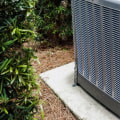The Department of Energy recommends replacing your HVAC system after 10 years for maximum efficiency. Some newer units can last up to 15 years, so it's important to check when yours was installed and ask a professional how long it should last. When your air conditioning system is more than 10 years old, consider replacing it with a unit that has earned the ENERGY STAR label. These high-efficiency units can save up to 20 percent on heating and cooling costs.
If you have a boiler, consider replacing it with an ENERGY STAR rated boiler that is 5% more efficient than a new standard model. It's a common question whether you need to repair or replace your heating, ventilation and air conditioning system. One of the most important factors is the lifespan of your unit. According to U. S.
EnergyStar, Environmental Protection Agency Voluntary Program and A, C., the unit lasts between 15 and 20 years. On average, a heat pump lasts 16 years and an oven operates between 15 and 20 years, This Old House reports. If your unit is more than 20 years old, it doesn't necessarily mean it's time to dispose of it. The published HVAC life expectancy dates are only average, meaning that half of all units sell out before that date, while the other half is still operating efficiently. EnergyStar recommends replacing your air conditioning unit every 10 to 15 years due to the federal government phasing out freon to conserve energy across the country. When it comes time to make the decision to repair or replace your air conditioning unit, age is an important factor.
If your air conditioning unit uses freon, you will eventually have to replace it to make the switch to the new R410A refrigerant. If your unit is breaking down or has problems related to the need for more freon, this might be a good time to consider replacing it. Air conditioning units will undoubtedly need repairs from time to time. However, if your system requires ongoing repairs, these may cost more than installing a new unit, so investing in a new unit is the best option. Before investing in a new HVAC unit, you may want to check your home and HVAC unit for costly air leaks. No matter how much preventive maintenance you dedicate to your HVAC system, there comes a time when repairs are no longer sufficient and it's time to replace it.
If you're wondering if your HVAC system needs to be replaced, a cost-benefit analysis can help you decide if repairing your old unit is as economical as simply replacing the unit completely.


